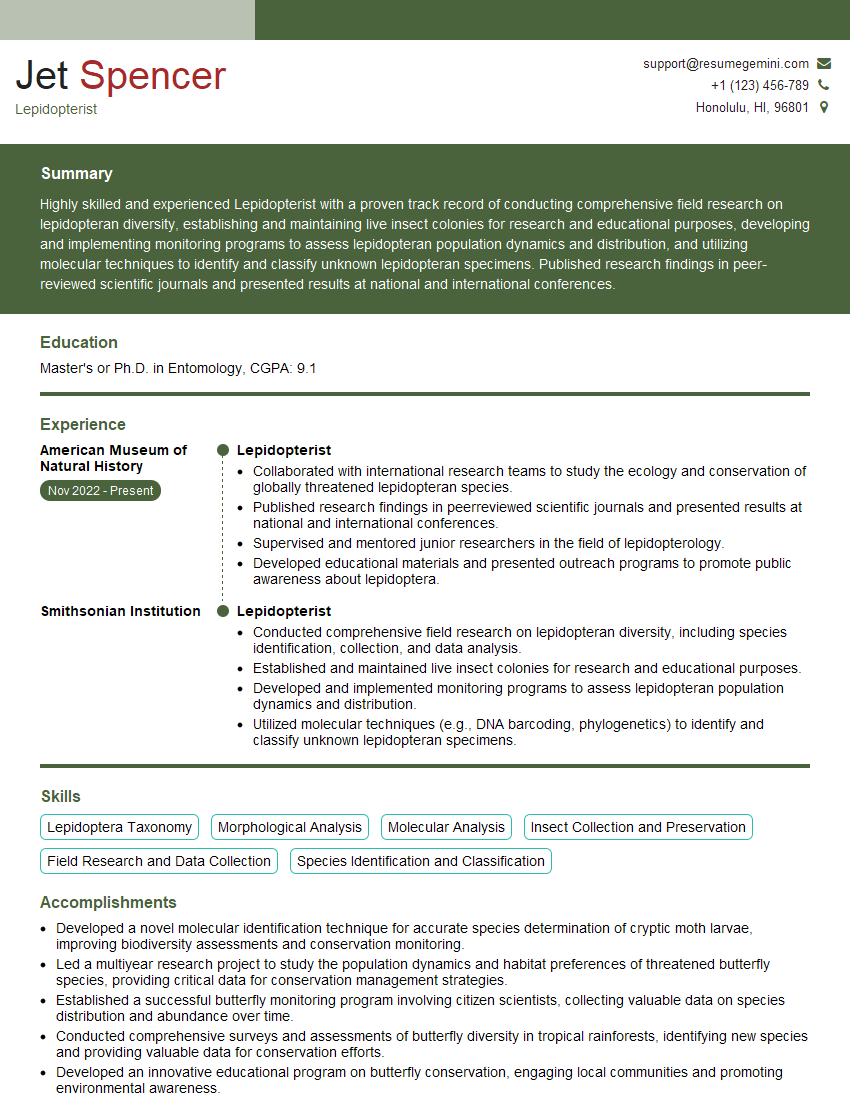Are you a seasoned Lepidopterist seeking a new career path? Discover our professionally built Lepidopterist Resume Template. This time-saving tool provides a solid foundation for your job search. Simply click “Edit Resume” to customize it with your unique experiences and achievements. Customize fonts and colors to match your personal style and increase your chances of landing your dream job. Explore more Resume Templates for additional options.

Jet Spencer
Lepidopterist
Summary
Highly skilled and experienced Lepidopterist with a proven track record of conducting comprehensive field research on lepidopteran diversity, establishing and maintaining live insect colonies for research and educational purposes, developing and implementing monitoring programs to assess lepidopteran population dynamics and distribution, and utilizing molecular techniques to identify and classify unknown lepidopteran specimens. Published research findings in peer-reviewed scientific journals and presented results at national and international conferences.
Education
Master’s or Ph.D. in Entomology
October 2018
Skills
- Lepidoptera Taxonomy
- Morphological Analysis
- Molecular Analysis
- Insect Collection and Preservation
- Field Research and Data Collection
- Species Identification and Classification
Work Experience
Lepidopterist
- Collaborated with international research teams to study the ecology and conservation of globally threatened lepidopteran species.
- Published research findings in peerreviewed scientific journals and presented results at national and international conferences.
- Supervised and mentored junior researchers in the field of lepidopterology.
- Developed educational materials and presented outreach programs to promote public awareness about lepidoptera.
Lepidopterist
- Conducted comprehensive field research on lepidopteran diversity, including species identification, collection, and data analysis.
- Established and maintained live insect colonies for research and educational purposes.
- Developed and implemented monitoring programs to assess lepidopteran population dynamics and distribution.
- Utilized molecular techniques (e.g., DNA barcoding, phylogenetics) to identify and classify unknown lepidopteran specimens.
Accomplishments
- Developed a novel molecular identification technique for accurate species determination of cryptic moth larvae, improving biodiversity assessments and conservation monitoring.
- Led a multiyear research project to study the population dynamics and habitat preferences of threatened butterfly species, providing critical data for conservation management strategies.
- Established a successful butterfly monitoring program involving citizen scientists, collecting valuable data on species distribution and abundance over time.
- Conducted comprehensive surveys and assessments of butterfly diversity in tropical rainforests, identifying new species and providing valuable data for conservation efforts.
- Developed an innovative educational program on butterfly conservation, engaging local communities and promoting environmental awareness.
Awards
- Recipient of the Lepidopterists Society Award for Excellence in Insect Taxonomy, for exceptional contributions to the classification and identification of butterflies and moths.
- Honored with the Entomological Society of Americas Presidents Prize, recognizing outstanding advancements in lepidopteran research.
- Awarded the International Union for Conservation of Natures Conservation Medal, for significant efforts in the protection and conservation of endangered butterfly species.
- Recognized by the National Science Foundation with a prestigious Fellowship in Entomology, for groundbreaking research on the evolutionary history of moths.
Certificates
- Certified Lepidopterist (CL)
- Entomological Society of America (ESA) Membership
- International Society of Tropical Ecology (ISTE) Membership
- Society for Conservation Biology (SCB) Membership
Career Expert Tips:
- Select the ideal resume template to showcase your professional experience effectively.
- Master the art of resume writing to highlight your unique qualifications and achievements.
- Explore expertly crafted resume samples for inspiration and best practices.
- Build your best resume for free this new year with ResumeGemini. Enjoy exclusive discounts on ATS optimized resume templates.
How To Write Resume For Lepidopterist
- Highlight your expertise in lepidoptera taxonomy, morphological analysis, and molecular analysis.
- Showcase your experience in insect collection and preservation, field research, and data collection.
- Emphasize your ability to identify and classify species using both traditional and molecular techniques.
- Demonstrate your commitment to conservation by highlighting your involvement in research projects focused on threatened lepidopteran species.
Essential Experience Highlights for a Strong Lepidopterist Resume
- Conducted comprehensive field research on lepidopteran diversity, including species identification, collection, and data analysis.
- Established and maintained live insect colonies for research and educational purposes.
- Developed and implemented monitoring programs to assess lepidopteran population dynamics and distribution.
- Utilized molecular techniques (e.g., DNA barcoding, phylogenetics) to identify and classify unknown lepidopteran specimens.
- Collaborated with international research teams to study the ecology and conservation of globally threatened lepidopteran species.
- Supervised and mentored junior researchers in the field of lepidopterology.
- Developed educational materials and presented outreach programs to promote public awareness about lepidoptera.
Frequently Asked Questions (FAQ’s) For Lepidopterist
What is a Lepidopterist?
A Lepidopterist is a scientist who studies butterflies and moths, collectively known as Lepidoptera.
What are the key responsibilities of a Lepidopterist?
Lepidopterists conduct research on the diversity, ecology, and conservation of butterflies and moths. They also work in museums and other institutions to identify and classify new species.
What are the educational requirements to become a Lepidopterist?
A Master’s or Ph.D. degree in entomology or a related field is typically required to become a Lepidopterist.
What are the career opportunities for Lepidopterists?
Lepidopterists can work in a variety of settings, including universities, museums, government agencies, and environmental consulting firms.
What are the challenges facing Lepidopterists?
Lepidopterists face a number of challenges, including climate change, habitat loss, and the use of pesticides.
What are the rewards of being a Lepidopterist?
Lepidopterists have the opportunity to learn about the fascinating world of butterflies and moths and to contribute to their conservation.
What are the key skills for a Lepidopterist?
Lepidopterists need a strong foundation in entomology, as well as expertise in field research, species identification, and molecular analysis.